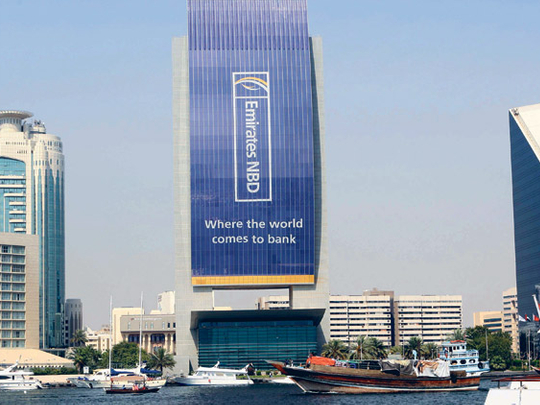
Dubai: Emirates NBD expects this year's net profit to top Dh3.4 billion, a 45.3 per cent increase from last year, when the bank's results took a hit from major debt restructurings in the UAE, the lender's top executive said yesterday.
Emirates NBD, the Middle East's largest bank by assets, will also step up its growth plans in Abu Dhabi and considers securitising additional parts of its retail loan portfolio to raise medium-term funding, chief executive officer, Rick Pudner told Zawya Dow Jones in an interview at the bank's headquarters located at Dubai's creek.
"We're looking at 2011 in a more favoured light than 2010. The target that the analysts are looking at for the group is Dh3.4 billion. I would assume that would include reasonable growth in revenue," he said, adding the analysts forecast was "in the right ballpark." The bank also targets five per cent asset growth, Pudner said.
Emirates NBD reported Dh2.34 billion in full-year net profit for 2010, a 30 per cent drop from 2009.
Still, a prolonged political crisis that has currently engulfed large parts of the Middle East could trigger higher oil prices and affect the regional and global economy.
Fear looms
"Obviously the longer the unrest goes on, we'll have some impact at some point on presumably trade business. It's a question of how long this crisis lasts and then what happens to oil prices. Everybody's fear coming through 2009 was a double dip in global performance. That is still quite frankly the fear. If things get out of hand and we go in the double dip we're all basically in the same boat again, Pudner said.
The Dh3.4 billion net profit forecast excludes the contribution of the financial gain on the 49 per cent stake sale in Network International, which is expected to be completed during the current quarter and which could add another Dh1 billion to Dh1.5 billion to the bank's bottomline.
Emirates NBD was one of the major creditors to Dubai World, the government conglomerate that undertook a $25 billion restructuring. The bank is also involved in the restructuring of Dubai Holding.
New rules
"In the sense of awareness of restructurings those are the two needed to be sorted. There will be restructurings going forward but in terms of profile those are the biggest. There will still be sporadic restructurings from one or two corporates. If you are in the property area-and it's not in all areas, it's not across the board-obviously cashflows are under pressure and that will continue for a while," Pudner said.
"It's [Dubai Holding] going to take time...we're hoping first half this year [for a resolution], that's the ambition but I don't know if that will be the reality," he added.
Emirates NBD's impaired loans ratio peaked to around 10 per cent in 2010 because of the Dubai World impact and the Dubai Holding restructuring could lift that number to between 13 per cent and 14 per cent this year.
Excluding the impact of those restructurings, the bank's non-performing loan, or NPL, ratio is "in the region of probably 4 per cent to 5 per cent and we expect the level of NPL's coming off moving through the second half of the year," Pudner said.
The UAE Central Bank recently introduced new rules on retail banking services in a bid to curb excessive personal lending that became a key component of the financial crisis.
"We all agree as bankers it is a step in the right direction to have a more robust framework around retail banking and debt, and long-term it will have very positive effects on the economy here," Pudner said.
Growth aspirations
"There may be some impact on the bottomline in the short term...but we're not sure yet. We've had a meeting with the central bank and there are committees now discussing individual items," he added.
Following a year of strengthening the balance sheet, Emirates NBD is now set to grow, particularly in its small- and medium-sized enterprise segment, as well as its private banking division — where it raised the number of relationship managers to 70 from very few two years ago. It also intends to expand its operations in Saudi Arabia and Abu Dhabi by opening at least 10 branches in the UAE capital in the next two years, Pudner said.
Overall the bank has 135 branches, including a recently-opened branch in Singapore, one representative office in India, a branch in London, which it wants to expand in the areas of trade and private banking, while it hopes to set up a representative office in Beijing this year.
The bank has sufficient liquidity to pay back Dh3.8 billion in upcoming debt maturities this year, but is looking at raising some medium-term funding, Pudner said, adding that it would consider a new securitisation of some of its retail loan portfolio. The bank was the first in the region in 2010 to raise $200 million through a car-loan securitisation.











